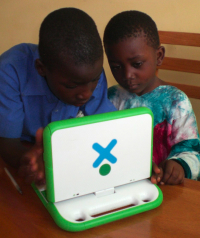We now have 37 OLPCs in Axim, Ghana with Ghana Together. Twenty are in the hands of individual children, one for one. They have access to them at any time they're in their Children's Home and not otherwise engaged.
The others are being used in Saturday classes for neighbor children. They now have neighborhood children coming in, and they have one of their Western Heritage Home children teaming with a neighborhood child to "teach" them all things OLPC. So, we have a pool of about 40-50 children now who are involved.
I will be going to Axim end of January for a month. I intend to follow this OLPC News site very carefully in the next several weeks, and record every "question" that people suggest. I'll see what I can learn. I will interview as many people as possible, including parents, teachers, and the children themselves and report back. I'm not saying it will be definitive, but it may be helpful. I agree---enough photos of cute kids with OLPCs and time for facts on the ground!
Our machines are not in a school, since we have too few for that (we are getting G1G1 from folks as donations---keep them coming, by the way). They do have a vocational computing instructor who helps them some (when not teaching adult classes).
Yesterday, in an informal conversation, the Manager of Western Heritage Home (the NGO we're partnering with) just casually offered the info, in the middle of a conversation unrelated to OLPCs, that she thought the OLPCs were making a big difference. She said most of the children, who are orphaned and had not been in school much if at all since about two years ago, have caught up and even surpassed their classmates in reading and math. She thought it was due to OLPC use every day, plus the books and learning materials we've brought, and daily homework.
I can report a few specific things we've learned that have been stumbling blocks (in the midst of mostly a very positive experience):
- We've had problems with the adapter cords splitting where the cord enters the adapter. The kids need to be careful, but this is definitely a weak spot. Anything to "ruggedize" them would be extremely helpful!
- We've had to provide a mouse for every OLPC, because of the jumpy cursor problem. We use only "cord" type (not wireless), since we don't want to introduce any more batteries than necessary. But, that's another challenge with the cords--another weak spot.
- They've had to reload the Activities of a few because they got "corrupted."(??) They took those machines the 50 miles or so by bus to a internet café in Takoradi. I've recently sent a thumb drive to rebuild OS and activities. More straightforward instructions about that would be helpful.
- The power strips we've been able to find in Ghana are very poor quality---another weak point. We've been begging some Ghanaians living in England to please bring some high-quality 220 type when they go back to Ghana for family visits. It's not unusual for the ones bought there to fail in a couple of weeks!
- The more complex activities seem to need direct instruction, esp. Etoys, Turtle Art, Scratch, and the Wiki searching. The kids don't seem to "discover" for themselves. But, I'll look into that more carefully when I get a chance to sit down with the children themselves. I have wondered since they have few textbooks in school, and only a few children's books we've managed to carry in suitcases, if maybe the concept of writing their own "book" is something they need to be coached on (referring to Etoys especially).
Enough for now. Thanks. I'll post something mid-March with more specifics. If anyone in Ghana with OLPC experience sees this, please contact me. Maybe we can meet up and share info.



For at least some of the 'corrupted' images, is it potentially being considered to have the flash drives 'restore' program check to see if there is space on the flash drive, and if so, copy off a compressed image for analysis of what went wrong?
Hi Maryanne
I am curious to know, how does the power strip fail? The plug points or is it physical damage?
Also, are you referring to power strips for G-type plugs like these?
http://en.wikipedia.org/wiki/File:G_plug.png
These plugs are used in Singapore & Malaysia as well and I'll be glad to send a few by post (if the postal service is reliable). Drop me a mail.